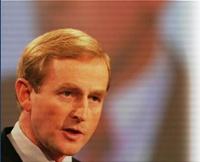Fine Gael wobble not over yet

Kenny has won the support of his party, but time will tell whether the electorate will take him into their arms. By Vincent Browne.
Enda Kenny is stronger after the leadership heave. The Fine Gael leader showed steel, decisiveness and nerve, qualities relevant to being Taoiseach. There was also a graciousness about him in victory.
Richard Bruton is weakened by the events of last week. He was outmanoeuvred by Kenny, he failed to test the ground among the backbenchers before starting the heave, his reliance on a party elite (the thrusting frontbenchers) was a miscalculation. His judgment was simply wrong. These weaknesses too are relevant to being taoiseach.
But the familiar problems with Kenny remain.
He doesn’t have a grasp of economic policy, knows nothing about banking, is fairly blank on most policy issues. Anton Savage of the Communications Clinic (which he runs with his parents Tom Savage and Terry Prone) has been domesticating Kenny for years now and, in truth, Kenny has improved a great deal.
But when it comes to heavy lifting on the economy, for instance, Kenny gets exposed, and it unnerves many people.
It certainly is not because Kenny is thick; he is not.
It is because he never applied himself to becoming familiar with these matters. During his entire Dáil career, from when he first became a TD in 1975 until he became leader of Fine Gael in 2002, he hardly said a single thing worth remembering - and, for a lot of the time, he said nothing at all.
Remember the crass racist remark he made at a book launch shortly after he became leader? During a holiday in Portugal, he asked a Moroccan barman why a cocktail was called a ‘Lumumba’ and was told it was named after ‘‘some nigger who died dans la guerre’’.
Kenny is not racist, but he knew nothing about Patrice Lumumba, the first democratically elected prime minister of the Democratic Republic of Congo, an heroic figure, who was murdered by the CIA because he was regarded as an unreliable American ally during the Cold War. That’s Kenny.
There is a yearning to be rid of Fianna Fáil and the Greens, but many people baulk at the spectre of Kenny. He doesn’t cut it and won’t cut it and, although his standing will rise in the opinion polls in the next few months, it will fall back again when the memory dims of his superb tactical performance over the past week.
There will be more palpitations in Fine Gael before the year is out - and don’t rule out another leadership wobble. But maybe he will stay and become the next taoiseach and, in truth, he could not possibly be worse than Brian Cowen.
Although Kenny has a knowledge deficiency, which is entirely his own fault, he will be as good a taoiseach (if that happens) as any of the alternatives, at least from the perspective of how he would shape society, or want to do so.
Kenny, like most politicians, has woolly ideas about fairness, about creating an enterprise economy and creating jobs, about stuff like equal opportunity.
Most politicians think of themselves - as does Kenny - as being an ideologicallyfree zone. Not capitalist, not socialist, not feminist, just democrats who want to do the best for Ireland, and most others - including us journalists - are the same.
But we are all weighed down with ideology, whether we know it or not and whether we like it or not.
We all have conscious or unconscious ideas of what kind of society is possible and desirable and, for most people, this conforms with the settled ideology which now runs along the following lines:
There is now no option but to curtail public spending because of the €20 billion hole in the state’s finances.
There is room for some extra taxation, but not too much, for too much tax will dampen enterprise.
We need more jobs, urgently, and a bit of stimulus via capital spending is fine, but we can’t overdo that either because our borrowings are so high.
Of course, we have to protect the vulnerable, and we will do all in our power to do so.
But, at the end of the day. . .
There’s no perspective at all about how unequal our society is and how we might address the fiscal difficulties by simply distributing the wealth better.
No appreciation of how more equal societies do so much better in the areas of education, health, obesity, mental health, teenage pregnancy, drug addiction, imprisonment, women’s rights and status and happiness.
No realisation that societies such as Denmark, Finland and Sweden do far better by most indices, even though taxation levels there are far higher and wealth more evenly distributed.
Those ideas, of course, would scare the electorate now, given the prevailing ideology, and compromise the chances of office. But what is the point of office if the same old is to be the same old again and again.
And isn’t the central point of politics to change the prevailing ideology?
Kenny would think this is all for the birds - and that is the real problem with him.
But that is also the problem with the cappuccino revolutionaries (and, for that metaphor, I am indebted to Pat Rabbitte).
